It’s the simple classroom greeting that triggers serious anxiety for a handful of students in almost every Gold Coast school.
“Welcome back, boys and girls.”
They are the students who are not quite sure which group they belong to — boy or girl.
They are the students who don’t know who to ask about gender identity … because they may not even be sure what to ask.
If they’re lucky, they are the students that Rachel Rive and the Expanded Horizons Team helps.
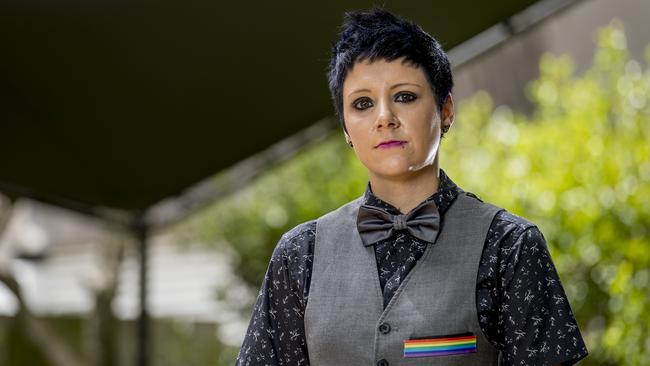
As the project officer of QSpace, a program specifically for young people aged 12 to 17 who are gender diverse, sexually or romantically diverse, intersex or questioning, Rachel helps these children learn the new vocabulary that affirms their identity — lesbian, gay, bisexual, transgender, non-binary, intersex, queer, questioning, asexual, pansexual and more.
She helps connect these children with health professionals who understand these patients can’t always tick the usual boxes — gender or otherwise, and helps build bridges with families who often are just as confused.
THE INTERVIEW: HAYDEN WHITWORTH
THE INTERVIEW: FATHER MORGAN BATT
THE INTERVIEW: DR AMANDA MCCULLOUGH
Rachel says every year the need for LGBTIQ+ support and education grows stronger — even as the funding for the program has been significantly cut.
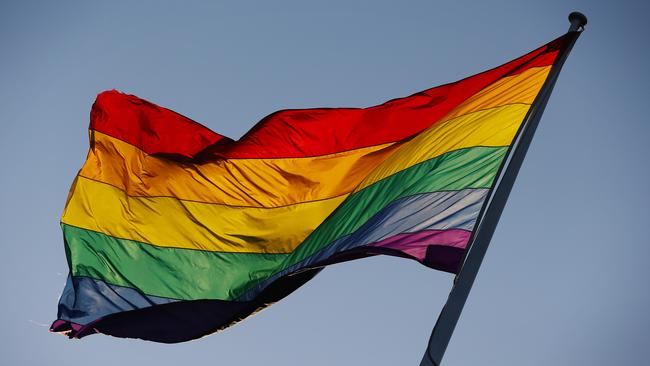
Two years ago the award-winning QSpace program was working with schools, attending community events and reaching out to students in need … now it’s just Rachel, herself on part-time, and Chiara, a casual assistant whose employment is only guaranteed until June. Together they support the dozens of children who turn up weekly for support and a safe space.
“Right before the postal vote happened, which was one of the most traumatic times for anyone in the LGBTIQ+ community, we basically lost the bulk of our funding. There was an increase in numbers attending due to homophobia and transphobia,” she says.
OTHER NEWS:
Mystery surrounding Coast dessert bar closure
Coast went to ‘hell and back again’
Army of residents ready for cane toad cull
“We went from four staff down to one, but the need was just growing. It still is. We can have up to 30 kids a week come to us, and those are just the ones who know about us, feel comfortable in coming and can make their way to our office.
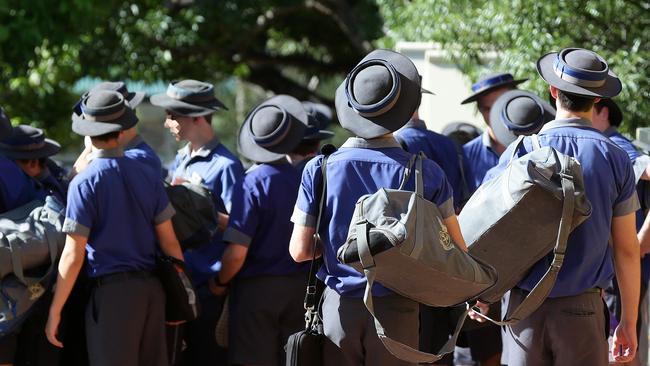
“In every school there are students who are questioning their gender, plus a large percentage of students who identify as sexually diverse — or who are just questioning who they are.
“It’s such a difficult time when you’re a teenager anyway, it’s really tough. Society’s vocabulary is very heteronormative and cisnormative — and most people don’t think that’s a problem — but to these kids, it’s just erasing their identities.”
Losing the program’s close connection to schools means it is now even more difficult for students to seek their services.
While some parents are uncomfortable with LGBTIQ information being distributed in schools, Rachel says it is essential for those in need of support.
“The truth is that this information is not going to convince any student to change who they are. But for those few who are questioning their identity, there is vital information that can help them,” she says
“Nobody wakes up one day and decides they want to make their life as a teenager even more difficult — and being gender and sexually diverse can be hard.
“We’re trying to still get the word out to young people that we are here for them. We are a safe space and we can help them find a way forward — but with such a small a small team of peer staff, including some very dedicated peer volunteers, across only a few days a week and not a lot of funding, it’s very tough.
“Meanwhile, the phone calls from parents, doctors and other groups just keep coming. This is an area where we all need to work together to support this community.”
Rachel says a number of schools on the Gold Coast have now started creating safe spaces for their students.
She says she is also advocating for better education for doctors and health professionals to use more inclusive language with their clients and to gain cultural competency in supporting LGBTIQ+ people.
OTHER NEWS:
The one reason cops raided this Coast property
Revealed: Spectacular new luxury Coast tower
Spit masterplan: Deadline too tight for ‘significant’ issues
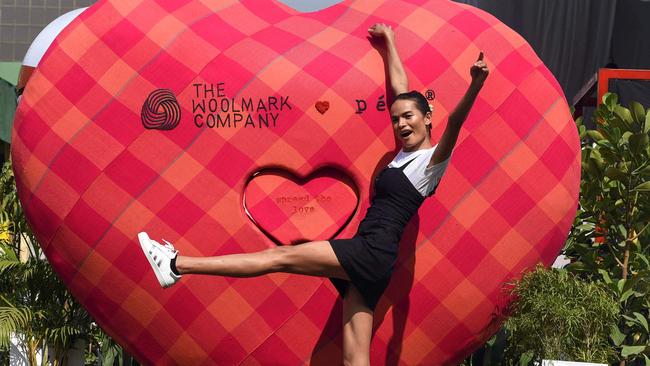
“Quite a few of the kids from QSpace say their schools now have ‘rainbow groups’ that meet, some of them are co-ordinated by a teacher and some are lead by a student ‘rainbow representative’, it’s really fantastic to hear that this is happening,” she says.
“But then we also hear of staff who require more support and education around pronouns, appropriate support services to refer to, affirming language and other ways to support LGBTIQ+ students.
“We also hear some real horror stories about doctors and other health professionals that they see. It might be the services that misgender, ask invasive questions, make assumptions or erase identities completely.
“Often it’s something easy to change, but a lifetime of feeling systematically erased is horrific. It can be part of the reason that suicide levels and drug and alcohol abuse are higher for the LGBTIQ+ population. It’s not because of who they are but because of how they are treated.
“I’d love to see a formalised education process introduced in our schools for kids and in our universities for these professions.
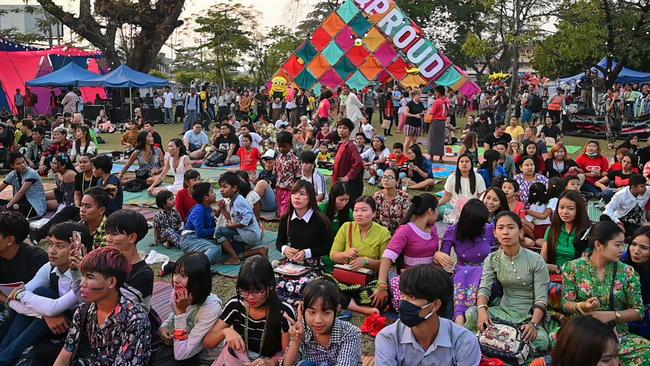
SUBSCRIBE TO THE GOLD COAST BULLETIN — JUST $1 FOR THE FIRST 28 DAYS
“The best thing that can happen for these kids who see us is so simple: inclusion. It’s life changing.”
It’s something that Rachel understands on a personal level.
The 33-year-old says she identifies as both queer and gender diverse and prefers the pronouns ‘she’, ‘her’ or ‘they’, ‘them’.
While she found her calling after studying for a diploma in community services, her road to ‘coming out’ was anything but straightforward.
“I grew up here on the Gold Coast but I kept my true identity secret all through school. I knew I was different but I just had no idea who I could talk to about it,” she says.
“The Coast can be a tricky place to be different. There was nobody who could say you should go here or talk to this person, I just had to sort of figure it out. That is why visibility is so important or having a rainbow representative that you know you can go to.
“In the end I was outed by someone else which was really terrible. It’s such a private thing but beyond that it can be a dangerous thing too.
“I was lucky that most of my family supported me. A lot of the kids I help now discover their chosen family because their first family won’t always accept who they are.”
Rachel says family rejection leads to high levels of homelessness among LGBTIQ+ youth, with QSpace doing their best to assist in providing donated toiletries, food and clothing to those in need.
She says the program welcomes donations of non-perishable food, with many young people uncomfortable in seeking help from unfamiliar services.
“Being homeless and LGBTIQ+ is really complicated. Even when they try to find shelter from the city’s services, most accommodations are gendered — it’s just another barrier when you’re non-binary or do not fit into the binary genders,” she says.
SUBSCRIBE TO THE GOLD COAST BULLETIN — JUST $1 FOR THE FIRST 28 DAYS
However, Rachel says there are many parents who want to support their child.
She says children can form a sense of gender identity from even a pre-primary school age.
She says QSpace provides referrals to appropriate support services, such as the gender clinic at Lady Cilento Hospital in Brisbane.
“It would be great if the Gold Coast had more specialised services here,” she says.
“For the younger Gold Coast community it can be difficult to access services only provided in Brisbane.”
Rachel says as well as QSpace, she also facilitates Q+, a program for those 18 to 25. She says the two groups provide support and hope for one another.
“A lot of the young ones go on to join Q+, so it’s fantastic to see those who choose to do some training continue on as mentors called Qpals,” she says.
“For the younger ones, it’s almost inexpressible what it means to them to see that there is a future. They can choose a family, be accepted, be safe.
“The transformations that we see here are incredible.
“They come here at first so full of anxiety and very quiet, then I watch them start to come out of their shells. I see them happier, chatting to others — they come up to me and say ‘thank you for this space’. So many say that it literally saved their lives.”
There’s another simple saying that summarises Rachel’s mission: ‘Be the person you needed when you were younger.’
Maybe that’s when you were a younger boy, a younger girl … or someone else altogether.

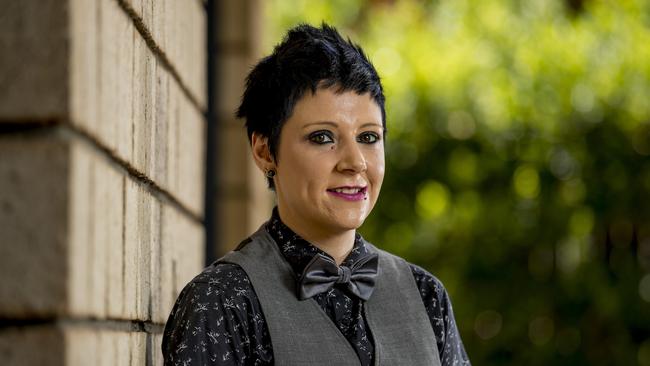
Add your comment to this story
To join the conversation, please log in. Don't have an account? Register
Join the conversation, you are commenting as Logout
Sharks unveil huge new stadium, $500m mega development
Southport Sharks has unveiled plans for a near-21,000-seat stadium and three residential towers in a massive redevelopment that could reshape the Gold Coast's sporting landscape.
Revealed: All Coast’s options for solving gridlock nightmare
The Gold Coast's population will surge by 350,000 in two decades, but the city's transport blueprint remains in limbo after light rail's dramatic cancellation. FIND OUT MORE